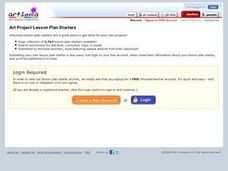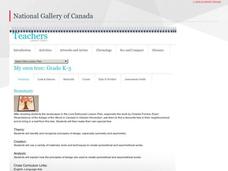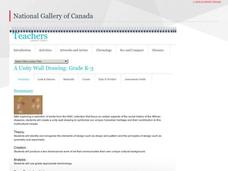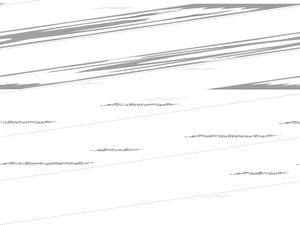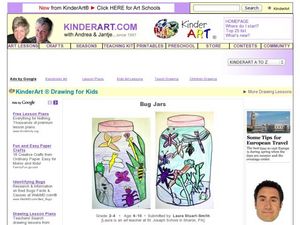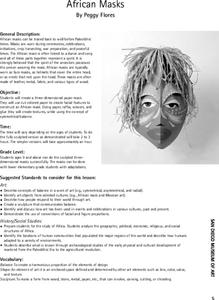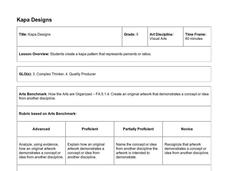Curated OER
Symmetrical Masks
Fifth graders examine symmetrical and asymmetrical balance while making a mask using a variety of colored pencil and marker techniques. They use the process of revision and design as they complete their masks.
National Gallery of Canada
My Own Tree
Nature contains both symmetry and asymmetry. Have your young artists examine symmetry and asymmetry in their own surroundings. After viewing works of art, pupils find trees in their neighborhoods and determine if they...
Curated OER
Let's Learn about Symmetry
Students explore symmetry in architecture. In this cross curriculum art and architecture lesson, students fold paper to illustrate symmetry and identify symmetrical and asymmetrical shapes. Students observe photographs...
Curated OER
Understanding Symmetry Through Visual Art
Have your class explore symmetry, radial balance and fractional parts in natural and man-made objects in their environment. Learners list examples and identify symmetrical and asymmetrical designs. Pupils are given a box of crayons and...
National Gallery of Canada
A Unity Wall Drawing
Build class community with an art project. Learners first examine and discuss works of art. They then contribute to a class mural by tracing their hands and decorating them in relation to their own cultures. The final mural...
Curated OER
Lines of Symmetry
Students practice dance to divide the space or body shape into equal sections to create symmetry in dance. In this symmetry lesson, students practice symmetrical and asymmetrical movements in dance. Students participate in move and...
Curated OER
Masks Paper Collage
Seventh graders create a symmetrical mask using tempura paint that displays interesting visual texture after watching an Eric Carle video. They apply collage in the making of the mask.
Hawaiʻi State Department of Education
Mask Symmetry
When you engage learners in creating symmetrical objects you are also building their vocabulary and math sense. Kids discuss key words such as, asymmetrical, symmetrical, balance, tint, and shade. They use these elements of design to...
Curated OER
Minimal Animals
Have fun creating imaginary creatures with this symmetry lesson plan! Your class will paint one half of their imaginary creature, fold their paper in half, which will result in a symmetrical figure. What a great art project to combine...
Curated OER
Composition Compositions
Pupils explore composition and symmetry to create their own digital media piece. For this design composition lesson, students visit the online websites and examples of asymmetrical compositions and symmetry. Pupils sketch a composition...
Curated OER
Principle of Art Balance
Reinforce a strong art vocabulary which can also apply to aspects of math and science. Kids read about various types of balance or symmetry found in art. They analyze three paintings based on vocabulary and read a how-to for creating...
Curated OER
Sensational Symmetry
Stdents create symmetrical designs by cutting folded paper in this cross-curricular lesson for the Math and Art classsroom. The lesson is adaptable for any grade or ability level.
Curated OER
Sculpture in Balance
Students discuss the difference betwen two-dimensional vs. three-dimensional art. In this art lesson plan, students discuss what symmetry or balance is in art and construct a symmetrical and an asymmetrical mobile.
National Gallery of Canada
Social Realism
Examine social strife in art. Class members first observe some pieces, and then find an image to inspire their own art. They outline the picture, analyze the composition, make alterations, and color their work.
Curated OER
Bug Jars
Students explore symmetry. Students observe a variety of bug and plant drawings, then draw a bug jar. Students observe bugs from the top of the jar for a symmetrical view, and the side of the jar for an asymmetrical view. ...
Curated OER
Balance
Students distinguish between symmetrical (formal) and asymmetrical (informal) balance. They create a black and white picture which displays both symmetrical balance and asymmetrical balance.
Curated OER
African Masks
Fourth graders create three-dimensional paper African masks. They analyze the geographic, political, economic, religious, and social structures of Africa. they discover that masks were worn for various ceremonies.
Hawaiʻi State Department of Education
Kapa Designs
I always knew there was a connection between art and math, and this lesson proves it. Fifth graders will use what they know about ratios and percents to design art inspired by Polynesian kapa cloth. A grid, specific guidelines, and the...
Dick Blick Art Materials
“Rhythm in Layers”
Young artists learn to build rhythm into a design by repeating colors, shapes, and patterns in a 3-D sculpture activity.
Curated OER
Artwork of World Cultures
Seventh graders research a culture and art produced by the people of that culture. They create a PowerPoint presentation to explain their findings. Students make a sand painting depicting the art of that era.
Curated OER
Elements and Principles Using a Movie
Young scholars identify the elements and principles that appear in an illustration of a room and explain each concept in writing. They watch this movie identifying each of the elements and principles of design portrayed in the interiors...
Curated OER
A Different Point of View
Fourth graders imagine what North Carolina looks like from the air. Looking at a map, they list the different kinds of views we might find, (i.e., beach, mountains, cities, farms, etc.) then attempt to draw their own version of a map.
Curated OER
Patterns & Balance
High schoolers compare and contrast the difference in the two sets of images and discuss the visual interest in the first set and the different visual interest created in the second set of prints.
Curated OER
Baked Polymer Clay 3D People Portraits
Students discuss methods of building forms with clay (ball and variations, snake, flat sheets). They draw a stick figure of what their sculpture may look like, including correct figure proportion.
